#mother iconoclasts
Explore tagged Tumblr posts
Text
Despite only getting back into the Iconoclasts fandom after so long, one personal headcanon still persists in my mind...that Mina - a pirate girl from another culture - acts as more of an authentic older sister figure to Robin than Elro - who is Robin's actual biological brother. And I'm sure there are other people who think that way as well.
But in all honesty, Elro...isn't actually a "real" brother. At least, not to me, in a sense. Not in a way that matters, anyway.
As far as relationships go, Iconoclasts does its best at showing off relationship dynamics, and how they affect other people. Grey went out of their way to court Black for a whopping 187 years, breaking down her barriers with utmost love, care and patience (up until Elro killed them, that is, and that's something I will never forgive him for). Royal met someone who also held an appreciation for flowers, which he loves the most (especially since Robin's nickname is "Sunflower"). Mina decides to stop running away, and turns over a new leaf to become a better person and secure a future that she can share with Samba.
The same can be held true for familial relationships, especially in instances where blood doesn't always make a family or even siblings. It's especially true when you compare how Elro acts around Robin to the way Mina treats Robin, or even how Mother treats Royal, her adopted "son".
With Robin and Elro, there is little warmth in how they interact, especially after the deaths of Henetta and Ella. I'd argue that there is very little love between them, either. Elro claims that he cares about Robin, but that "care" is relegated to how she should stay home where he thinks she'll be safe, even despite the fact that she's practically an outlaw and staying home will result in guaranteed Penance for her. Before he died, Polro wasn't much better off, either, insisting that Robin live a safer life as a farmer, like her mother and maternal grandfather. Robin literally finds more comfort in the machines she makes, and that's heartbreaking! And it is only after Robin kills God himself and restores the planet that Elro finally gives in and tells her that he won't tell her what to do anymore.
Robin and Elro may be siblings, but Elro sure as hell doesn't present himself as a kind and loving brother in a way that all older siblings are meant to. At least, not after Polro's death. Even Black sees Elro as a piece of garbage, though that's only due to him being responsible for the death of the first person she came to love.
On the other end of the spectrum, you have Mina. Robin just met Mina, and the two don't know very much about each other. And they only end up getting together when the One Concern attacks Isilugar, and then when Black kidnaps Samba after White dies.
And yet, within the short timespan...you can tell that Mina and Robin's relationship is far more genuine compared to that between Robin and Elro. There is love, care, respect, and protectiveness. Mina encourages Robin to go out and make her mark on the world, instead of sitting at home doing nothing. Like Elro, Mina worries for Robin's well-being; however, unlike Elro, Mina also acknowledges that Robin is her own person, and that she perfectly capable of handling herself, especially after Robin solos Black in the detritus sand pit. They may not share the same blood, but the feelings they exhibit are so real despite Mina not necessarily having the purest intentions at heart compared to Robin. Not to mention the way they work together during boss fights, with Robin incapacitating the opponent and leaving them wide open for Mina to make the killing blow (the Inti boss fight is a perfect example of their teamwork, especially when they high-five one another). Mina is able to establish a warm place that Robin can call home, and acts like a "real" older sister.
I might be looking a little too deep into this, given that I'm a huge sucker for the "found family" trope, and I like seeing how two unrelated people can develop familial or sibling bonds compared to "official" or "real" families/siblings. Kinda makes me want to write a thesis paper about it, lol.
#Deci rambles#Robin#Mina#Royal#Elro#Agent Black#Agent White#Agent Grey#Mother#Samba#robin iconoclasts#mina iconoclasts#royal iconoclasts#elro iconoclasts#agent black iconoclasts#agent white iconoclasts#agent grey iconoclasts#mother iconoclasts#samba iconoclasts#Iconoclasts#long post#Iconoclasts spoilers
12 notes
·
View notes
Text





I got bored and decided to boot up Cassette Beasts just to mess around with the character customization and replicate the four main characters, including Black.
Note that they’re not exactly 1:1, only the closest I could get to the original character designs. Elro definitely got the closest, though.
- Mod dBCoatl
#not a quote#Iconoclasts#Cassette Beasts#I don’t even like Elro all that much tbh#tied with Mother as my least fave IC character
10 notes
·
View notes
Text
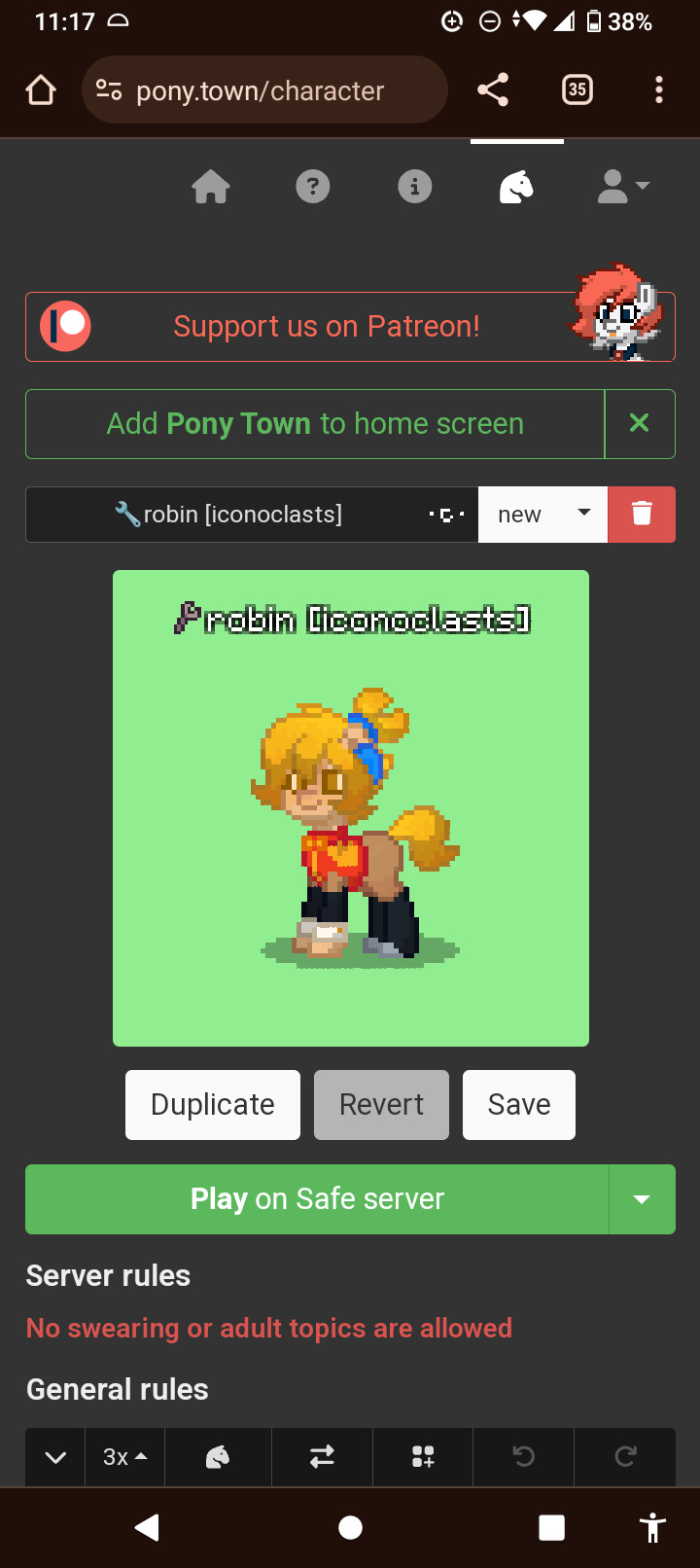
Shout out to this robin pony I made back in the day
Please excuse her human skintone nobody on Pony Town will fucking talk to you unless ur a human horse
#text that should be about royal#iconoclasts#robin#I wonder if I'm the first person to document an iconoclasts pony#Also no wrench rn cuz I forgot you can have that now#Actually this has me thinking about an mlp au#Everyone is a blank flank until they are assigned some sort of magic tattoo or smth by mother#Also everything is tv y7. Is chrome an alicorn?
8 notes
·
View notes
Text
Indie rpg games (/--)/
hey!today i brought some of my favorites games!!! mostly (or all of them) are rpg and have an pixel design. those are my favorite kind of game, but they aren't very famous....... I would appreciate some recommendations as well. (´゚��゚`)
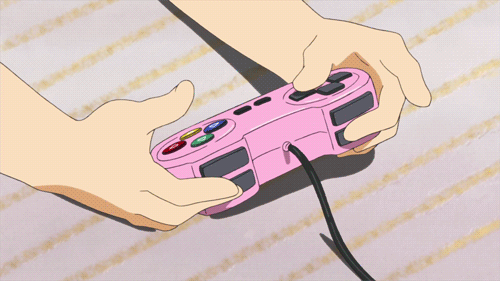
1. Limbo
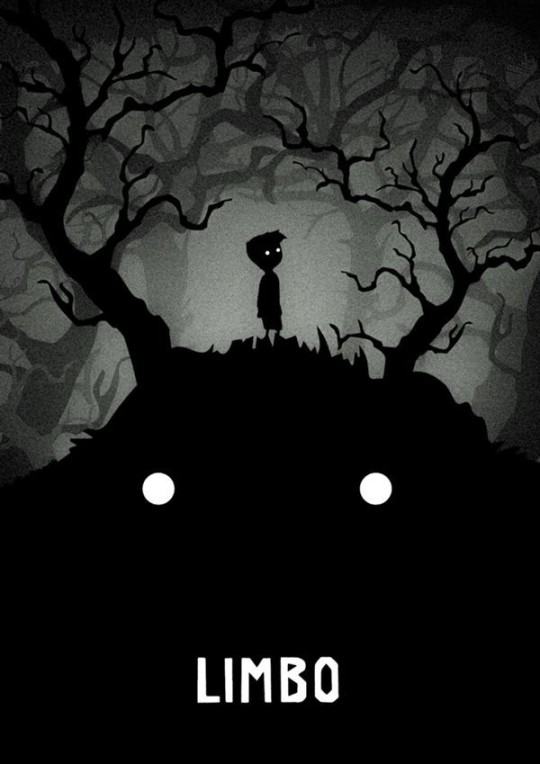
Sensible... and have a lot of puzzles, but it's fun.
2. Heartbound
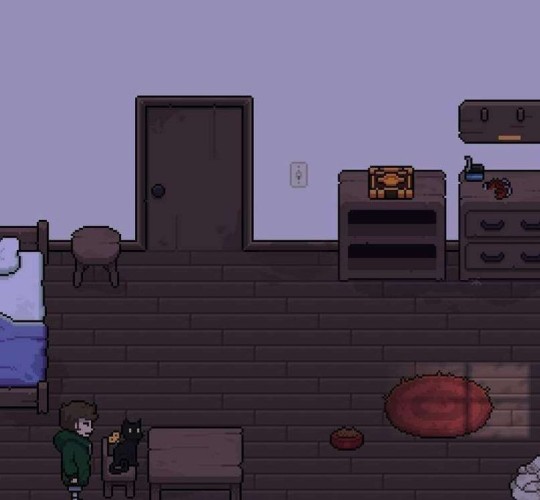
this one isn't complete yet, but the uncompleted version have a lot to offer already. I love the history and the characters, also the universe its very beautiful. I love the office part and the character in the office (ToT) I love this one, and I am very excited to play the complete version
3. Iconoclast
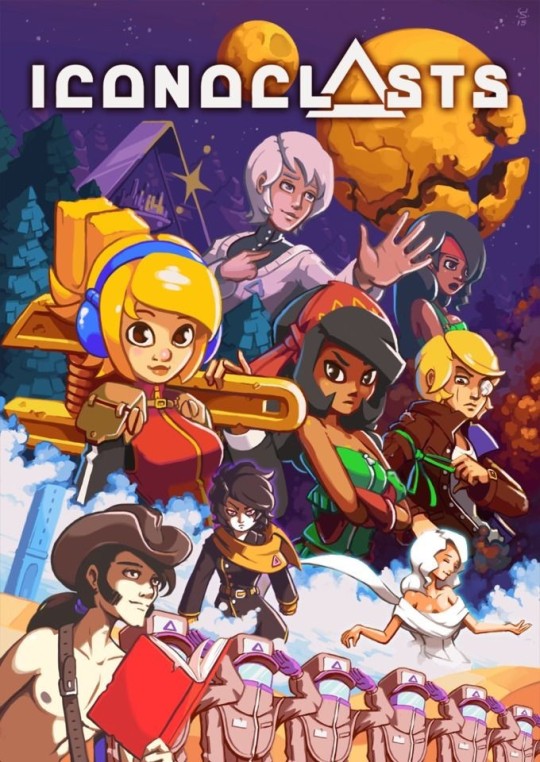
this is a very long game. you can spend like days playing, and really put a effort to it. I love the characters as well. if it was a book, it would be my favorite. the history is very good as well. IT not requires a high processor, so you can install in every computer. ( ・3・)
4. Papers, please
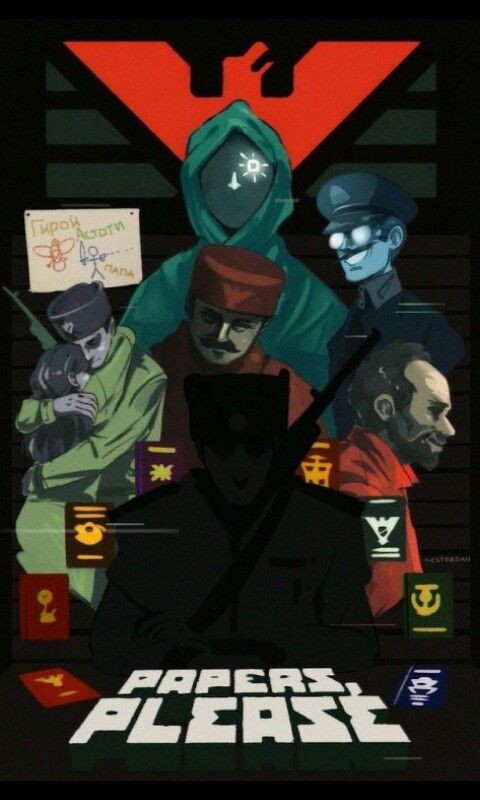
this one isn't a rpg. It acctualy have a very interesting context, so, briefly, you are a employee working in a border of a country. there a lot of politics issues going on, so if you made a mistake and allow an entrance of a danger person, you gonna die or have drastically consequencs. Also, your family suffers with you choices. I love this one so much! it's fun, and take a lot of effort to do the right choices. your actions have real consequences, and you can achieve different ends as well. ( *´・ω)/(;д; ).
5. undertale
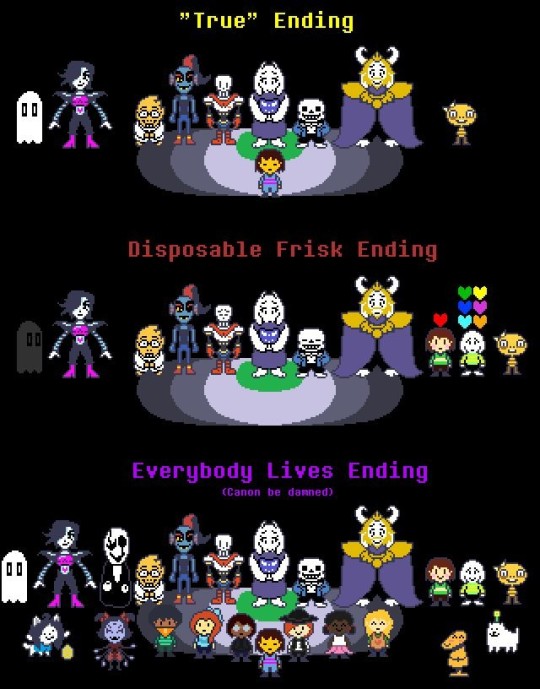
undertale is pretty famous. It's an rpg where a child falls in to the underground, where lives "dangerous monsters" but when you start exploring and understanding that place, you figure a lot of things. there's 3 possible endings (I guess) and it's also a game of "actions have consequences" I played this one so many times. (*´;ェ;`*)
6. Shovel Knight
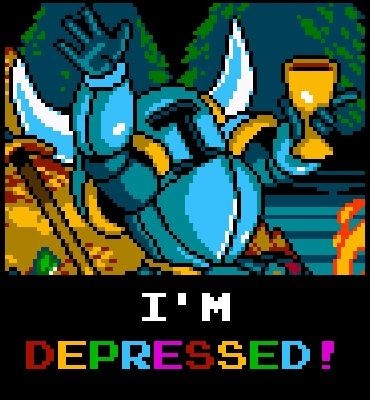
Love this one! it's the most simple of this list, but is also pretty long. rpg, and in pixel, the proposal of this game is explore, fight and win against some enemies. you can play with different characters, and the world is very big, so exploring it its fun. Takes time to finishing it, and it's very comfortable to play. (゜o゜)\(-_-)
7. Hotline miami
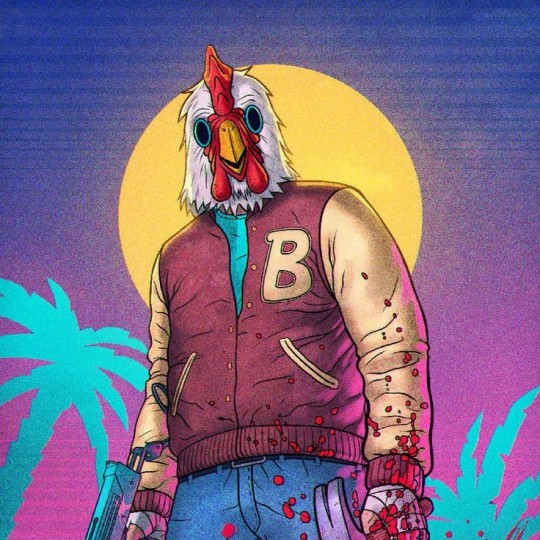
violent and have a awesome soundtrack. there are two volumes, both are great, but the first one hits different. It's nice to play when you got a frustrating day, to overcome you anger and.... you know... (-.-)ノ⌒-~
8. one shot
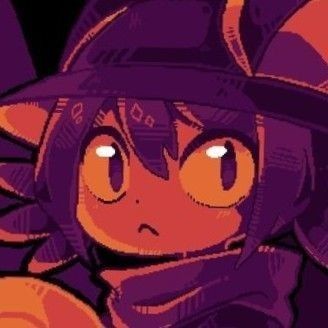
I love thiissss, but the last time I played was several years ago, so I don't remember very well. bur I do remember that it felt great. ( °∇^)]
mother 3 or earthbound
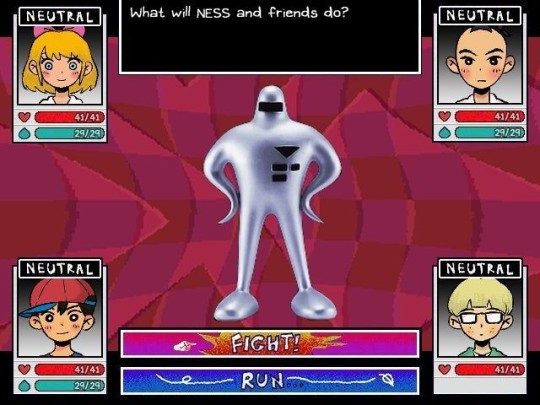
the last of the list... the first of my heart.
this is a nitendo game, so you can play on your phone if you install a emulator to snes. The room is easy to find online \(^-^)/ love the characters and it have a great history. I played more then one hundred times, and I always cry (even though it's not a sad game)
this is it!!! thanks for reading \(^_^)/
(;_;)/~~~
#game#indie games#indie rpg#indie rpg games#iconoclasts#undetale#hotline miami#one shot#shovel knight#mother 3#earthbound
4 notes
·
View notes
Text

It’s about these two guys from Iconoclasts
why is triangle man such a cunt to everyone
1K notes
·
View notes
Text


“I guess you’d have to say that Mother was, but I’m not an eccentric. I’m an iconoclast. A breaker of images. Can you appreciate the difference?” —Edith Beale
44 notes
·
View notes
Text
Eva Von Valancius...finally picked a first name

I am making her a Noble Officer from an Imperial World.
Darkest Hour: You are a bastard, an illegitimate member of a family that immediately turned its back on you. Triumph: Your strong presence and persuasiveness stopped a feudal war between neighbouring systems.
This is one of my first OCs I'm not giving some traumatic background. She was born a bastard noble. She was shunned by the family and her father. She was still given education and a life of luxury. Raised by her mother who worked in intelligence for the noble family (which is why she still grew up on the estate). Her mother's occupation did play into her upbringing as well.
She got an education, had a stint at the Adeptus Administratum (never again). Constantly overlooked and demeaned by her family despite her brilliance. As she is extremely ambitious and recognized her family would never give her the station she deserved, she ended up leaving to work and eventually become mentored by a Planetary Governor. There she made a name for herself as an outstanding diplomat, stopping a feudal war between neighboring systems.
She is someone who has worked extremely hard to make up for the circumstances of her birth. The irony that she became Rogue Trader because of her bloodline is not lost on her (and a bit annoying because in the end her hard work ended up not being what elevated her status). There is some shame and some insecurity about her new role, she hides this and never shows it...well maybe to a certain someone...
This is a pretty good description of who she is:

Iconoclastic. She likes people who go against the mold and aren't satisfied with where they are in life.
26 notes
·
View notes
Text
RT BUILDING QUESTIONS - CHARACTER & CONVICTIONS by @pheedraws 🤍
▶ CERYS VON VALANCIUS

6. What is their Conviction? How adherent are they to it? Does it change at all over the course of the game?
Cerys is Dogmatic, with a sprinkle of Iconoclast. Raised by a Sororitas mother she'd hardly be anything else, and is overall pretty set on her ideals - though her methods tend to sway to the more merciful side (for Imperium standards). Her hand tends to lighten a bit throughout the events of the game, but Commorragh hardens her right back to path.
7. Was there a defining moment in their life that influenced their Conviction?
Less of a single defining moment, and more of moments where it was reassured. Cerys went through a lot of hardships in her many years of service, and believes that even in her darkest hours it was the saving light of the God-Emperor that urged her forward. Even when her actions are unorthodox, she only carries forward if she believes the ends will serve mankind.
8. What was their Triumph? Do they take pride in it?
Feat of Greatness. Cerys was deployed into a planet that was losing ground to chaos forces, and managed to reestablish order to the scattered Imperium regiments before adding her own guerrilla to the mix, and they turned the tides (even though she butt heads with many superior officers). If you ask, she will give you the expected Militarum answer and say she was only performing her duties - but she is prideful, and that victory has swelled that a little bit.
9. What was their Darkest Hour? How does it affect them today?
Shadow of Torment. That same victory cost her a lot, as she was captured by the near-end of the assault and tortured in hopes to reveal any and all information that could prevent her enemies' defeat. Cerys suffered intensive damage to her skull, jaw, and brain before her brothers disobeyed direct orders to not rescue her, and did just that. Nowadays she struggles with minor physical and mental hindrances, insomnia and congenital analgesia, as well the expected PTSD that she swallows down with all her might.
10. How do they feel about becoming a Rogue Trader? How easily do they take to being the head of the von Valancius dynasty?
As a servant of the God-Emperor, she hardly disputes it. If that is the path set to her, she will carry it out as diligently she would any other duty. It's disorienting, for sure, but she gets on track as soon she manages to shake the initial shock off. She does, however, feel incredibly lonely, even if now she's got infinitely more resources and people she could ever think of possessing. Cerys had brothers in arms, countrymen and fellow guardsmen - now she has servants, and a cold spot where that camaraderie was before.
#rogue trader#cerys von valancius#rt building questions#I know like 2 people are reading these but I'm having a lot of fun filling it <3
13 notes
·
View notes
Text
Fics I Enjoyed in January
I was putting together a list of the best fics I read last year and was reminded of two incredible ATLA fics I read in February 2023 ((Never) Forget Who You Are by mindbending and up in the city (until the stars lost the war) by Madseason). Those two fics are absolute perfection and sent me down an Avatar: The Last Airbender rabbit hole this month.
I read an insane amount, for me, even more than I did last year in September/October, when I was chowing down Drarry longfics like a starving dog. There's approximately 993k words of fic in this rec list - if you assume the average novel is 90k, that's about 11 books!
half in the shadows, half burned in flames by r_astra Avatar: the Last Airbender | Gen | 4k | Not Rated
“They say you tried to kill the Firelord,” Hakoda says. "Why?" Zuko doesn’t know how to answer. Because I hate him. Because I love him. Because he wants to see the world burn. Because he knotted one hand in my hair and cupped flames against my face with the other. Because my mother is dead. Because my uncle is dead. Instead, he shrugs tiredly and says: “Someone has to.”
i am through finding blame by sokkaesque/@sokkagatekeeper Avatar: The Last Airbender | Gen | 6k | Teen & Up
Sokka was fourteen the first time he realized people didn’t apologize to him very often. Or, Sokka during The Southern Raiders.
a nation, held by snowdarkred/@snowdarkred Avatar: The Last Airbender | Gen | 6k | General Audiences
It doesn’t take long for the rumors to start. The Fire Nation prides itself on its civilization. It isn’t like the other, lesser, nations who throw their children away by sending them into war. They are to be protected, because children are the future glory of the nation. The crown prince is thirteen when his father burns his face in front of an audience of hundreds.
The Iconoclast by ranilla_bean/@ranilla-bean Avatar: The Last Airbender | Sokka/Suki/Zuko | 21k (WIP) | Explicit
After a protracted civil war, the victorious new Fire Lord sends a call for a new bodyguard across the four nations. A Southern Water Tribesman and a warrior from Kyoshi Island respond.
Life in Eden by WitchofEndor/@a-witch-in-endor Avatar: The Last Airbender | Gen | 14k | Not Rated
In which Ursa tries to be a better parent to Azula, and it doesn’t change very much. And then, quite abruptly, it changes everything.
While Mighty Oaks Do Fall by WitchofEndor/@a-witch-in-endor Avatar: The Last Airbender | Sokka/Zuko | 181k (WIP) | Teen & Up
The newly-crowned Fire Lord Ozai offers his firstborn son to service in the temple. This turns out to be a catastrophic mistake.
where the stars do not take sides by WitchofEndor/@a-witch-in-endor Avatar: The Last Airbender | Sokka/Zuko | 60k | Not Rated
When Azula is nine, she becomes an only child. She hears the Fire Lord call for Zuko's life, and in the morning, her mother and brother are gone. Azula may be young, but she isn't naive. She knows what happened to them. Which makes it all the more surprising when Azula tracks the Avatar down and fights his group of peasant friends, only to find herself staring into an eerily familiar face.
War Crimes by Lovely_Elbow_Leech/@lovelyelbowleech Avatar: The Last Airbender | Sokka/Zuko | 90k | Mature | Part 1 of All's Fair
Book one ends with two major differences: 1. Sokka went on the mission with Hahn (it did not go well) 2. Zhao survives the North Pole and that proves unfortunate for everybody (except Zhao, obviously). Imprisoned on Zhao’s war ship, Sokka and Zuko have to work together to survive. They are not very enthusiastic about this prospect. And they argue. A lot.
War Games by Lovely_Elbow_Leech/@lovelyelbowleech Avatar: The Last Airbender | Sokka/Zuko | 443k (WIP) | Mature | Part 2 of All's Fair
Sokka is aware that being friends with the enemy is going to bring complications, but he probably should have guessed that being friends with Zuko in particular, was going to be a bit like dunking your head repeatedly into a bucket of angry Fire Ferrets.
Below the Sun by CSHfic and VSfic Avatar: The Last Airbender | Sokka/Zuko | 25k | Teen & Up
Sokka is washed overboard while working on the fisherman's boat during the storm. He wakes on a deserted island. Or... mostly deserted.
Will We Last the Night by CSHfic and VSfic Avatar: The Last Airbender | Sokka/Zuko | 143k | Teen & Up
Chief Arnook never assigns Sokka to protect Princess Yue, so he goes to fight the Fire Nation with the other men. When the moon dies, and the ocean spirit takes its revenge, Sokka is caught standing on the deck of a Fire Nation ship. Sokka should have drowned… and he would have drowned, if not for a certain Fire Nation raft fleeing the North Pole. [An enemies-to-lovers season 2 rewrite, where Sokka is separated from the gaang during the Siege of the North, and travels the Earth Kingdom with Zuko instead].
116 notes
·
View notes
Text
Little OC thoughts/lore dump post about Imogen because I finally made it out of Act I in my new playthrough, and I think the big choice at the end of the act is one I just like to chew on for why my Rogue Trader did what she did.
As a refresher, Imogen is a Navy Officer from an Imperial world. Her parents were both in the Navy, and so were their parents, and so on. Point is - because of how she was raised, she's been pretty entrenched in Imperial dogma her entire life, though this was tempered with her mother's benevolent style of parenting. She's still primarily falling on the Iconoclast side of things, a trait she inherited from her mother, but when things look rough she often falls back on the whole "what would the God-Emperor do" sort of thing.
Which is why, when it came to the fate of Rykad Minoris, it was these two who's counsel she put the most weight behind.

So, ultimately she blew up the planet. She was a good little servant of the Imperium this day, and it's going to haunt her for a very long time.
#headcanons and oc lore#oc: imogen von valancius#i had been contemplating with making imogen's home world a fortress world instead#but i think her being from an imperial world is better for the iconoclast aspect of her#if she grew up on a world embroiled in war i think both she and her parents would be purely dogmatic#i'm still contemplating most of the details about her parents#but her mom being a bit soft-hearted and her inheriting that is an important part of her character
11 notes
·
View notes
Text

Donald Sutherland
Commanding and versatile actor known for his roles in MAS*H, Don’t Look Now and The Hunger Games
Donald Sutherland, who has died aged 88, brought his disturbing and unconventional presence to bear in scores of films after his breakthrough role of Hawkeye Pierce, the army surgeon in Robert Altman’s M*A*S*H (1970), one of the key American films of its period. It marked Sutherland out as an iconoclastic figure of the 60s generation, but he matured into an actor who made a speciality of portraying taciturn, self-doubting characters. This was best illustrated in his portrayal of the tormented parent of a drowned girl, seeking solace in a wintry Venice, in Nicolas Roeg’s Don’t Look Now (1973), and of the weak, nervous, concerned father of a guilt-ridden teenage boy (Timothy Hutton) in Robert Redford’s Ordinary People (1980).
Although Sutherland appeared in the statutory number of stinkers that are many a film actor’s lot, he was always watchable. His career resembled a man walking a tightrope between undemanding parts in potboilers and those in which he was able to take risks, such as the title role in Federico Fellini’s Casanova (1976).
Curiously, it was Sutherland’s ears that first got him noticed, in Robert Aldrich’s The Dirty Dozen (1967). During the shoot, according to Sutherland, “Clint Walker sticks up his hand and says, ‘Mr Aldrich, as a representative of the Native American people, I don’t think it’s appropriate to do this stupid scene where I have to pretend to be a general.’ Aldrich turns and points to me and says, ‘You with the big ears. You do it’ … It changed my life.” In other words, it led to M*A*S*H and stardom.
Sutherland and his M*A*S*H co-star Elliott Gould tried to get Altman fired from the film because they did not think the director knew what he was doing due to his unorthodox methods. In the early days, Sutherland was known to have confrontations with his directors. “What I was trying to do all the time was to impose my thinking,” he remarked some years later. “Now I contribute. I offer. I don’t put my foot down.”
Sutherland, who was born in Saint John, New Brunswick, Canada, was a sickly child who battled rheumatic fever, hepatitis and polio. He spent most of his teenage years in Nova Scotia where his father, Frederick, ran a local gas, electricity and bus company; his mother, Dorothy (nee McNichol), was a maths teacher. He attended Bridgewater high school, then graduated from Victoria College, part of the University of Toronto, with a double major in engineering and drama. As a result of a highly praised performance in a college production of James Thurber’s and Elliott Nugent’s The Male Animal, he dropped the idea of becoming an engineer and decided to pursue acting.
With this in mind, he left Canada for the UK in 1957 to study at Lamda (the London Academy of Music and Dramatic Art), where he was considered too tall and ungainly to get anywhere. However, he gained a year’s work as a stage actor with the Perth repertory company, and appeared in TV series such as The Saint and The Avengers. He was Fortinbras in a 1964 BBC production of Hamlet, shot at Elsinore castle and starring Christopher Plummer. He also appeared at the Criterion theatre in the West End in The Gimmick in 1962.
In 1959 he married Lois Hardwick; they divorced in 1966. Then he married the film producer Shirley Douglas, with whom he had twins, Kiefer and Rachel; they divorced in 1971. Kiefer, who grew up to become a celebrated actor, was named after the producer-writer Warren Kiefer, who put Sutherland in an Italian-made Gothic horror film, The Castle of the Living Dead (1964). Christopher Lee played a necrophile count, while Sutherland doubled as a dim-witted police sergeant and, in drag and heavy makeup, as a witch.
In an earlier era, the gawky Sutherland might not have achieved the stardom that followed the anarchic M*A*S*H, but Hollywood at the time was open for stars with unconventional looks, and Sutherland was much in demand for eccentric roles throughout the 70s.
He was impressive as a moviemaker with “director’s block” in Paul Mazursky’s messy but interesting Alex in Wonderland (1970), which contains a prescient dream sequence in which his titular character meets Fellini. In the same year, Sutherland played a Catholic priest and the object of Geneviève Bujold’s erotic gaze in Act of the Heart; he was the appropriately named Sergeant Oddball, an anachronistic hippy tank commander, in the second world war action-comedy Kelly’s Heroes; and he and Gene Wilder were two pairs of twins in 18th-century France in the broad comedy Start the Revolution Without Me.
Sutherland was at his most laconic, sometimes verging on the soporific, in the title role of Alan J Pakula’s Klute (1971), as a voyeuristic ex-policeman investigating the disappearance of a friend and getting deeply involved with a prostitute, played by Jane Fonda.
Sutherland and Fonda were teamed up again as a couple of misfits in the caper comedy Steelyard Blues (1973). It initially had a limited distribution due mainly to their participation together in the anti-Vietnam war troop show FTA (Fuck the Army), which Sutherland co-directed, co-scripted and co-produced.
Sutherland always made his political views known, although they surfaced only occasionally in his films. In among the many mainstream comedies and thrillers was Roeg’s supernatural drama Don’t Look Now, in which Sutherland and Julie Christie are superb as a couple grieving their dead daughter. Despite the dark subject matter, the film was notable for containing “one of the sexiest love scenes in film history”, according to Scott Tobias in the Guardian, the frank depiction of their love-making coming “like a desert flower poking through concrete”. The actor so admired Roeg that he named another son after him, one of his three sons with the French-Canadian actor Francine Racette, whom he married in 1972.
John Schlesinger’s rambling version of The Day of the Locust (1975) saw Sutherland as a sexually repressed character – called Homer Simpson – who tramples a woman to death in an act of uncontrolled rage. Perhaps Bernardo Bertolucci had that in mind when he cast Sutherland in 1900 (Novecento, 1976), in which he is a broadly caricatured fascist thug who shows his sadism by smashing a cat’s head against a post and bashing a young boy’s brains out. “And I turned down Deliverance and Straw Dogs because of the violence!” Sutherland recalled.
In Fellini’s Casanova, the second of his two bizarre Italian excursions in 1976, Sutherland coldly calculates seduction under his heavily made-up features. The performance, as remarkably stylised as it is, still reveals the suffering soul within the sex machine.
In 1978 he appeared in Claude Chabrol’s Blood Relatives, a made-in-Canada murder mystery with Sutherland playing a Montreal cop investigating the murder of a young woman. More commercial was The Eagle Has Landed (1976), with Sutherland, attempting an Irish accent, as an IRA member supporting the Germans during the second world war, and as a chilling Nazi in Eye of the Needle (1981). Meanwhile, he was the hero of Invasion of the Body Snatchers (1978), who resists the insidious alien menace until the film’s devastating final shot.
In 1981 Sutherland returned to the stage, as Humbert Humbert in a highly anticipated version of Vladimir Nabokov’s Lolita, adapted by Edward Albee. It turned out to be a huge flop, running only 12 performances on Broadway. Both Sutherland and Albee played the blame game. “The second act is flawed,” Sutherland said. “Albee was supposed to have rethought it, but he never did.” Albee told reporters that he had scuttled some of his best scenes because they were “too difficult” for Sutherland because “he hasn’t been on stage for 17 years”.
Continuing his film career, Sutherland played a complex and sadistic British officer in Hugh Hudson’s Revolution (1985), and in A Dry White Season (1989) he took the role of an Afrikaner schoolteacher beginning to understand the brutal realities of apartheid. In Oliver Stone’s JFK (1991), he held the screen with an extended monologue as he spilled the conspiracy beans to Kevin Costner’s district attorney hero Jim Garrison.
After having made contact with young audiences in the 70s with offbeat appearances in gross-out pictures The Kentucky Fried Movie (1977) and National Lampoon’s Animal House (1978), the latter as a pot-smoking professor, he was cast as an unconvincing bearded stranger in Buffy the Vampire Slayer (1992).
On a more adult level were Six Degrees of Separation (1993), in which he played an unfulfilled art dealer; A Time to Kill (1996), as an alcoholic, disbarred lawyer (alongside Kiefer); Without Limits (1998), as an enthusiastic athletics coach; and Space Cowboys (2000), as an elderly pilot. By this time, he was gradually moving into grey-haired character roles, one of the best being his amiable Mr Bennet in Pride and Prejudice (2005).
The Jane Austen novel was also featured in the television series Great Books (1993-2000), to which Sutherland lent his soothing voice as narrator. Other series in which he shone as quasi baddies were Commander in Chief (2005) – as the sexist Republican speaker of the house opposed to the new president (Geena Davis) – and Dirty Sexy Money (2007-09), in which he played a powerful patriarch of a wealthy family.
Sutherland continued to be active well into his 80s, his long grey hair and beard signifying sagacity, whether as a contract killer in The Mechanic, a Roman hero in The Eagle, a nutty retired poetry professor in Man on the Train (all 2011), or a quirky bounty hunter in the western Dawn Rider (2012), bringing more depth to the characters than they deserved. As President Coriolanus Snow, the autocratic ruler of the dystopian country of Panem in The Hunger Games (2012), Sutherland was discovered by a new generation; he went on to reprise the role in three further films in that franchise, beginning with The Hunger Games: Catching Fire (2013).
He played artists in two art-world thrillers by Italian directors: in Giuseppe Tornatore’s Deception, AKA The Best Offer (2013), he was a would-be painter helping to execute multimillion-dollar scams, while in Giuseppe Capotondi’s The Burnt Orange Heresy (2019) he was on the other side of the heist as a reclusive genius targeted by a wealthy and unscrupulous dealer (Mick Jagger).
Aside from James Gray’s science-fiction drama Ad Astra (also 2019), in which he co-starred with Brad Pitt, Sutherland’s best late work was all for television. In Danny Boyle’s mini-series Trust (2018), which covered the same real-life events as Ridley Scott’s All the Money in the World, he played J Paul Getty, the oil tycoon whose grandson is kidnapped; while in The Undoing (2020), he was the father of a psychologist (Nicole Kidman), reluctantly putting up bail when her husband (Hugh Grant) is arrested for murder.
For the latter role Sutherland was in the running for a Golden Globe, having already received an honorary Oscar in 2017.
He is survived by Francine and his children, Kiefer, Rachel, Rossif, Angus and Roeg, and by four grandchildren.
🔔 Donald McNichol Sutherland, actor; born 17 July 1935; died 20 June 2024
Daily inspiration. Discover more photos at Just for Books…?
52 notes
·
View notes
Text
[RT OC] My Rogue Trader Character Building
Answers about my Rogue Trader Hermine to @pheedraws's questions! Thank you so much🥰🥰

BACKGROUND:
1. Where are they from? What is their homeworld like? Do they miss it?
Hermine came from a Hive City of the Calixis Sector. Its structure reflected that of the Imperium, with the noblemen leading an extravagant life in the Spire and laborers in the bottom slums. She was born in one of the dirty, crowded hab zones, nothing worth to miss.
2. What is their Origin? Who were they before they became a Rogue Trader?
3. Do they have a good relationship with their family? Who were they closest to growing up?
Noble—Bastard—Planet governor, without real relationships with her family. Hermine's mother was called up by some nobleman in the Spire once and got pregnant by accident, the unexpected child more like a burden to her. To Hermine, her mother was always an exhausted, gloom figure, numbed by years of hard work. Before she died in poverty and illness, she told Hermine of her father. A few weeks later, she appeared from nowhere in the middle of her noble father's study, and blackmailed him with her identity. He sent her away by assigning her as the governor of a distant small planet, and so she left her homeworld.
4. What does their name mean? Is it significant?
It came from Steppenwolf by Hermann Hesse, one of my favorite books. I named my character with it because "von Valancius" sounded like German. In the book Hermine led Steppenwolf to enjoy the worldly pleasure, which became the very basis of my character.
5. Describe a memory from childhood they think of fondly.
CHARACTER & CONVICTIONS:
6. What is their Conviction? How adherent are they to it? Does it change at all over the course of the game?
Hermine's Conviction is composed of Dogmatic III—Heretical II—Iconoclast I. She follows the Imperium's dogmatics in major events only because she doesn't want to be crushed by the Imperium rather than being pious, and she can be casual with petty things. Also, she leads an epicurean life, thus constantly seduced by the Chaos. For her there is only a silver lining between light and corruption.
7. Was there a defining moment in their life that influenced their Conviction?
Hermine once witnessed a public execution towards the suspects of heresy back in her childhood in the Hive City, which put the fear of the Imperium in her--or at least to act like this.
8. What was their Triumph? Do they take pride in it?
Planet governor, without much pride. To her it was only an access to the gracious life.
9. What was their Darkest Hour? How does it affect them today?
Bastard. It was a leverage she used to climb to the spire, and the absent father left her with some subtle *daddy issue*.
10. How do they feel about becoming a Rogue Trader? How easily do they take to being the head of the von Valancius dynasty?
Hermine didn't want to be a Rogue Trader, due to her comfortable life as a planet governor. However, the title has brought her a much more colorful life, as well as more gracious, and she forgets how unwilling she was at first.
RELATIONSHIPS:
11. Who amongst their retinue are they closest to?
Pasqal. Their connection is completely spiritual. Although they are different in many ways, they do share a strong intellectual curiosity. They often have friendly debates on topics that are highly theoretical, and they can respect and understand each other. Hermine serves as a mediator between Pasqal and the secular world. She gives much freedom to him in her own voidship, and meets as many needs of his as she can. In return, Pasqal takes good care of the machine spirits in her ship.
12. Who amongst their retinue do they clash with the most?
Ulfar and Argenta, to whom some of her behaviors are absolutely heretical.
13. Are they romantically involved with anyone? Do they wish to be?
Calligos Winterscale. They are kindred spirits with complex connections of benefits, appealed to each other but unable to put their guards down. Their relationship develops in an unexpected way given they were only meant to be allies at first. However, Hermine is good at letting things go naturally, so they share an open relationship now, managing their own dynasties when separated, and focusing on each other when together.
14. Who was the most important person in their life prior to becoming a Rogue Trader? Is that person still in their life now?
Her mother, not only because she brought her up, but also because her miserable way of death made Hermine swear to herself that she would never die like that.
15. How do they feel towards Theodora? Had they met before? Were they close?
Hermine prefers to be free and easy, and she wasn't used to the bossy way of Theodora. Both of them had a poor first impression on each other. However, Hermine can understand her more after experiencing the life of a Rogue Trader, and appreciates how well she can manage such a large dynasty.
SKILLS & EXPERTISE:
16. What is their Archetype?
Officer—Master Tactician. She is good at making people serve her.
17. What are their strengths in combat? What are their weaknesses?
Hermine is a good shooter, and she can clear some pawns with her pistol. However, she has to rely on her attendants in close. ("Abelard!")
18. How do they approach conflict? Do they tackle problems head-on, or is coercion favourable to them?
19. Which three skills are of the most value to them?
Persuasion, Coercion and Commerce. Hermine tends to solve problems through negotiation, and she won't appeal to arms unless necessary.
20. Do they have a talent or hobby that would surprise others?
Hermine likes collecting all kinds of trinkets, which includes xenos artifacts like ghost sword and weapons like stinger ring, but none of them has ever really comes in handy so far.
APPEARANCE & PERSONALITY:
21. Do they have any notable markings? Scars, birthmarks, tattoos, etc.?
22. Do they have any augmentations? Were these installed out of necessity, or as a cosmetic choice?
Hermine lost her left eye in a rebellion back in the planet she governed, and replaced it with augmentations.
23. How do they hold themselves? Is the persona they show the world different to who they truly are? Who is privy to the 'real' them?
It depends on what she wants to accomplish and who she deals with. Most of the time Hermine appears to be a shallow, flirty social butterfly, which can confuse her rivals, but she can turn into a shrewd businesswoman when needed and catch them off guard. She is a fickle person, and even her close attendants cannot say what is real in her.
24. Do they place value in how their protectorate sees them? Does this sway their decisions at all?
She does, but only in the sense of practicality, because she needs resources from them. Hermine believes that the people are simple and easy to incite, which makes them both useful and dangerous, and it depends on the situation whether to be a ruthless tyrant or an amiable friend. Everything serves the benefits of the dynasty, or rather, herself.
25. Wildcard: Share a fun fact, random thought, or headcanon about them!
Hermine has a frequent nightmare, in which she was climbing a high tower with many other people. She was all sore and exhausted but had to cling to its verticle wall, for she knew she would fall off and die if she let go. To survive, she had to put up with all this and kept climbing.
9 notes
·
View notes
Text
Royal: Y-you said I could trust you, Mother! You said you were a GAMER! Mother: Royal... I only play mobile games. Royal: NOOOOOOOOO!
#source: deltarune#Royal#Mother#all this angst#Iconoclasts#incorrect quotes#incorrect iconoclasts quotes
3 notes
·
View notes
Text
youtube
Can't add the exact timestamp (it's at the end) but they just??? Jump off screen???? Do they not die???
My general consensus with this fight is that it's just extra content and... in-between canonicity. They don't show up in the credits (in a scene) regardless if you kill them or not, and the pupils are alive(?) or possibly some other ones are alive as they could just look similar/be reused sprites
long speculation under the cut
Fitzroy is lore for sure which contradicts some of the implications about trancending that we get but like. Royal is kind of a dumbass AND is being told all of this from mother/one concern. There's multiple implications of the "ancestors" (both isi and Him followers) coming from somewhere else/resetting the planet and leaving instructions/tech for their respective people to use. Fitzroy seems to fit in the between stage before the concern has studied the tech, but AFTER the Ancestors arrived/reset the planet. In The Tower and the Bastion there are images of famous earth landmarks (taj mahal, new York, pyramids I think) implying that some sort of Earth was destroyed/minerals drained (more connections to the themes about environmentalism) and that humanity was "reset". RIGHT BUT CANONICITY. Fitzroy is more lore... If u want him to be. The true past of humanity is still foggy ESPECIALLY with conflicting views from Him followers and the Isi. The concern claims to have longer records of history, and has aforementioned images, but they shape it to their beliefs and leave out certain parts intentionally as well as only educate people deemed more faithful (concern staff) and censor/mysticize parts for the common folk and ESPECIALLY city one residents. Cough cough 'merica haha but not really I doubt he was thinking about Americans specifically. This is more likely a commentary on religion specifically they larger ones and how they shape societies views and history! (Remember when we used B.C?) I'm not going to say this is an effective commentary or a scathing remark on Christianity (I believe that Christianity is used as a reference as it's the poster child to westerners for what "religion" is. He probably intended for this to be about religion as a whole but like. Come on. It's definitely Christianity with a few changes to make it a "generic religion" especially with the focus on punishment and ascension to a "good place". They also use sin/sinners a few times but that may be for familiarity especially since he had a whole npc for explaining terminology) that aside. Canonicity. Again. The history behind the Starworm followers vs the Isi is intentionally left a mystery! Fitzroy and Leticia are real as fuck (if u think they're canon) and provide some ideas for what actually happened in history but who knows! I should get back to my conversation I got distracted haha.
#text that should be about royal#iconoclasts#lore speculation#mothers corners#Youtube#long post#analysis#(?)#also feel free to reply my ideas are very foundational especially on the religion part :-P but I have a lot of thoughts on xtianity#Being seen as “what religion is”. Especially when not every culture uses the “good place bad place” idea#Or the nobility of suffering Or Or the focus on punishment and atonement#I do think elro is telling the truth with what they teach the lower class so I may use him as a point of reference in the future#He's also a really funny and interesting character. I also completely understand why people don't like him#I'm sorry for not having other examples but he is literally Walter fucking white#Oh my God for Halloween I should draw him in that costume. I have an old sketch of him as reanimator actually#I'm too shy to show it tho hehe... Also the only connection is “science” and “crazy syringe!”#Also by calling him funny I mean his actions are. I like how he gives up on his religion immediately...#Definitely only because it affected him personally (penance) but he probably wasn't that devout#If a follower anyways. Especially with Robin helping out. “Lol it won't get me!” >Wife and daughter die#A lot of his actions are absolutely caused by grief and I really like how he's written. I like the themes of grief!#He's absolutely an asshole tho ESPECIALLY to mina actually honestly to any woman in his life#Teegan get with a real man. Fuck that guy. Also counting grey as a woman in this instance. Woman in a lesbian way not as a gender#Teegan is the only person who survived elro besides robin#themes#Teegan has her shit TOGETHER. I saw her and Gustavo talking in the credits I hope they become good friends :-)#robin survived elro and like he won't try to protect/control her anymore but... God...#elro#(mentioned) (also I might talk about him in the future I really like how iconoclasts deals w grief)
3 notes
·
View notes
Text
The Great Escape?
[ @iconoclast-infidels from X ]
Nova confirmed she could see, and therefore also hear, both Nico and Dmitry, and then after Dmitry's suggestion of an escape, she'd become a fighter. She was so much like Nico it was stunning to Dmitry. All that time, he knew Nico felt all sorts of complicated feelings regarding her, but one thing was always clear - the halfling missed his mother, and seemed to idolize her to some extent. It was only fitting that he took after her, too. That fighting spirit was something striking.
Dmitry held back a grin at the nickname Nova called Nico by.

That was a new one. He'd have to ask about it later, for sure, especially with Nico's reaction. "I'm Dmitry," he answered, helping Nico support Nova so they could get out of there. At least through the veil no one could see them or stop them from breaking out.
But Nico was right. Getting out of there had to be done. Dmitry didn't like it there either, not after his own experiences in such places. Were there good things to remember? Sure, maybe a mere handful. Black construction paper for origami cranes was something he suddenly decided he needed again. But for the most part, the time there had sucked and he wanted to forget. Forgetting was not easy.
"Let's go home," he said to Nico quietly.
24 notes
·
View notes
Text




Adolph Dehn, The Great God Pan (1940)
Over at the Philadelphia Museum of Art site you can see the multiple layers of this screen print by Adolph Dehn of some nuns painting the god Pan. Pretty great.
This lithograph is also great:

I'd never heard of Dehn's work before — he was a friend of the great Wanda Gág, whose book Millions of Cats I read to my kids “millions and billions and trillions” of times.
He did a lot of nun pieces:



Here's a biography of Dehn from The Smithsonian:
Dehn's satirical prints of European and New York scenes were the product of an unconventional Minnesota upbringing and an iconoclastic eye. The son of a feminist, socialist mother and an atheist, anarchist father, he was not destined for a quiet life. He studied at the Minneapolis Art Institute and the Art Students League in New York, after which he was imprisoned as a conscientious objector during World War I. On his release Dehn took odd jobs and made his way to Europe, where his work as a magazine illustrator supported him and his Russian immigrant wife in their travels. While in Europe Dehn was a critical observer of the social scene, especially in Vienna and Berlin, and a light-hearted painter of park scenes and landscapes. In 1930, after his return from Europe, his work, on both European and New York subjects, was shown at the Weyhe Gallery in New York City. The critical response was good, but sales were only moderate. In the mid-1930s, Dehn began to paint watercolor landscapes, which proved immensely popular. As a result, new commercial opportunities opened, including travels through the United States, Mexico, and Venezuela. His fame led to offers to teach and then to work for the Navy during World War II. Throughout the forties, fifties, and sixties, Dehn and his wife traveled around the world, doing commercial work and lithography. His work became less satirical and more fanciful, and he experimented with new graphic techniques. He died of a heart attack in 1968 while planning new trips, beginning a book, and organizing a retrospective.
See more of his (non-nun) work here.
22 notes
·
View notes